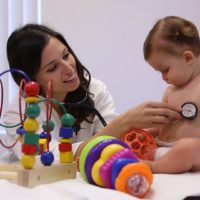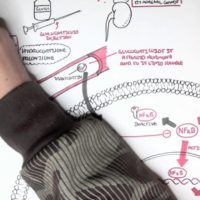In St. George’s University, term 1 consists of Anatomy, Histology and Biochemistry. The most difficult of the courses is going to be Anatomy, least is going to be Histology and Biochemistry falls in between. Anatomy has the most credits, and because of its’ labs, it takes up a lot of time. I am going to write from my own personal experience, on how I did very well in all three courses.
Histology
Histology requires that you prep for the lab, as it is all about presentation. From my experience, we were either picked randomly, or we as a group decided who would go first. Some facilitators may do the random choice and if so, it is better that you know your work so you aren’t stumped during presentation. Not only that but because they are grading us for professionalism points, etc., you want to make sure anything they put down is positive, so you gain those small points.
Prepping for lab isn’t just labeling and that is it. It is always a good idea, as Anatomy and Biochemistry are going to take up most of your time, to study while prepping. Try to gain as much information from prepping as you can, so that reduces how much time you are going to actually study for Histology. Imagine if you just prepped for the course but you didn’t study, this means you have to put time aside for prepping and then finding time to study. Time is the most important thing in med school and it is definitely a luxury worth having.
If you study while prepping, you will do very well. The questions on exams, may come across like vignettes similar to Anatomy but the last couple of lines are where the information to answer the question is. Don’t panic when you see these long questions.
I would also suggest labeling your slides thoroughly. Label everything that can be labeled, because those slides that come in the final or midterm, are easy points! If you can identify a spec on an image, that’s a point right there. This is a good buffer, just in case you forget the information for some of the questions, later on.
Anatomy
Anatomy is very difficult because you have questions before every lab. The wet lab has 3 clicker questions, where you have to identify the images that are assigned for that week. The dry lab, which consist of the small group and ultrasound, have images and questions. The images could be first, second or third order, and the questions the same. I would suggest while prepping for the small group, that you also do some studying. Try to answer the questions without looking up. Of course if you have to, by all means. I would also suggest getting the soft copy of the atlas, and textbook so that finding the information is just a click away. It makes it easier and cuts your prepping time down significantly. For the dry lab, label every single possible thing on the images. Most of the time the images are in the atlases that you have, and don’t bother to look at.
As for the wet lab portion of anatomy, going to the lab about 3 times a week, and going through everything over and over again, helps. If you go when the new specimens for the upcoming lab are introduced to the wet lab and students, when the wet lab session actually comes up, that hour will be spent reviewing and not trying to figure things out. It’s pretty hard to figure things out in the time frame that they give you. This is why there are open hours, and it is there for you to make the information redundant. If you decide to do the open labs with a group, make sure you at least spend one of those days you are in open lab, by yourself so that you can go over the items alone. No one is going to be helping you when the wet lab exams come around and you have 1 minute to answer, so you need to have that information coming to you much quicker. Another thing, check and see who is available to help show you things, during open hours. Some of the upper termers, are hoping to become surgeons, so they are very informed on the anatomy of the body. Not only that but they give you simple landmarks so that you can identify your structure quickly. Also, utilize the lecturers appointments for wet lab, it helps a lot.
In regards to the written aspect of the course. That Anatomy review book is golden. Don’t just go through it and regurgitate the answers, but try to process why the answer is such and why the wrong ones aren’t the answer. Knowing the reasons for each option, helps broaden your options in regards to studying material. So instead of knowing the answer, now you know the variables that are needed for the other answers to be correct.
Now head and neck is a very difficult section, and even with the lectures it’s hard to understand. I would suggest using You Tube to learn how to draw the cranial nerves, and draw them over and over again. Those are some high yield information on the final. You want to know everything that has to do with anything, in regards to the cranial nerves; function, where they enter and exit, and what happens when a lesion develops.
Biochemistry
This course is all about memorization. All you need to know to do well in this course, is in the lecture notes. I would answer all the objectives thoroughly. They don’t lie when they say the questions for the exams, come from the objectives. Then do as much practice questions as possible. Pre midterm, the department does a very good job with providing practice questions but this kind of declines afterward. But if you join any DES groups, you will have a load of questions to practice from.
For the small groups, I used those as a way to practice the information that I had studied. It was another good way to review the information.
Other tips
Joining DES groups on facebook, is a smart tactic. If a person’s DES group closes pretty fast, during sign up, it means they are very good. I would suggest knowing when the sessions to sign up are available, and get your spot. Don’t get caught up in going to DES sessions every single day, because although they are helpful with guiding your studying, you need to still study on your own. They can only make sense of the information, but they cannot help you retain it.
Something I did also, and thank my learning strategist for, is writing up a study schedule. I had myself a white board, that I would sit down for a few minutes and write down a study schedule for the week. If I didn’t finish something the day before, I adjusted it, so that I would finish that up before. For biochemistry, before I started a study session, I would review prior work and make sure I remembered it. Lecturers say repetition is key and they are absolutely correct. Post midterm becomes a little more difficult in Biochemistry throughout the whole time, while Anatomy dies down a bit and picks up when head and neck comes around. This gives you a chance to spend more time on Biochemistry and less on Anatomy. This doesn’t mean neglect Anatomy because that lower body questions, weighs just as much as the Head and Neck questions. You can consider those guaranteed points in the exam.
I will update this post, whenever more advice comes to mind. Try to remain calm during your time at med school, and remember that others before you did it. So when you feel like giving up, keep remembering that because there will be doubtful moments. But it doesn’t mean you have to actually quit.
Related Posts
How to Give a Good Presentation Next Post:
Netflix From All Countries































